Saturday, September 30, 2006
Kathavaseshan(The Deceased) Malayalam - 2004
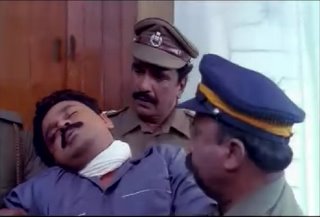
This movie is a beautiful example of how one can make good stories out of newspaper headlines. T.V. Chandran has written a story from a contemporary incident that he felt deeply about.I wish there are more directors like T.V.Chandran who will make realistic, hard hitting and original screenplays. Rather than make movies out of social issues with loads and loads of masala stuff.
All is not great about the movie though. The screenplay has got big holes, and at times you cannot help but laugh. But T.V.chandran compensates all of the shortcomings with a great climax. A climax that is shocking and hard-hitting. It brings down the wandering screenplay into a crashing halt, putting the whole movie into perspective.
kathavaseshan is about Gopinath Menon.An engineer by profession, he is all set to marry renuka menon.But suddenly one day he commits suicide. His fiancé Renuka Menon is shocked, but she is also curious about why he committed suicide.She had spoken to him for a little while and from what ever the short time she interacted.He doesn't seem to be a week hearted person. She starts to investigates about him.She talks to various people who knew gopinath and tries to paint a picture of his life and why he committed suicide. The reason why he committed suicide is the climax.
 Dileep & Jyothirmayi
Dileep & JyothirmayiFollowing the typical citizen kane style Renuka's talks to gopinath's friends and acquaintance to know more about him. Unlike "Ek din achanak" in this movie the falsh backs are not biased this is just a straight forward story peiced together through various peoples. Renuka first goes to gopinath's village where she meets Janardanan(Vijayaragavan). Through him she comes to know gopinath's past love affair and how his long time girl friend got married to someone else.When you think that this is the reason for his suicide.the story takes the turn, actually gopinath was little sad, but he wasn't upset to commits suicide. He wasn't the usual guy who would take this matter to his heart and commit suicide or becomes a devadas.Rather he goes to her girl friends wedding and wishes them good luck.This intrigues her more. Such a strong willed guy. why did he commit suicide.?

Later renuka meets gopinath's friends/room mates from calcutta and ahmedabad.They tell more about gopinath, how he bleeded for every needy person. Renuka's search doesn't take her anywhere. At the end one of his old roommate comes and reveals the reason for his suicide.And i don't want to reveal the reason. watch it for yourself.

The movie is not all perfect it has some glitches. The story gets developed with renuka meeting peoples who knew gopinath. T.V.chandran over does the “coincidence meetings” to narrate more about gopinath.The height of this is that of a thief who comes to steal at renuka's house.when caught he starts telling about gopinath and how he helped him. Another stupid scene was at the suicide investigation agency. T.V.Chandran could have introduced gopinath's diary or something to avoid this too many coincidences thing.

"For those of us who have been thrown into hell, mysterious melodies and the torturing images of a vanished beauty will always bring us, in the midst of crime and folly, the echo of that harmonious insurrection which bears witness, throughout the centuries, to the greatness of humanity. -Albert Camus"

The movie starts with the albert camus quotes and shows the suicide. It then slowly pieces together a man, who feels deeply about peoples and is always ready to help and care for others. Through the flashbacks of so many people we come to know gopinath menon. A man who has impacted the life of so many people, a man who has made so many peoples life better. Through his life the director points out many things that we have ceased to feel for in this modern and materialistic world.
The movie talks about the sensitivity that we have lost.After watching the movie all i remembered was Vijay tendulkar's words on an outlook interview
I find increasingly that the media is out to deceive me, me as in the ordinary reader or viewer. There is an organized effort towards that, all raw material is turned into a thriller of some kind, there's a sense of breathlessness. That's misplaced because the genuinely important issues do not induce such urgency. News has to be reached to people with facts and in its right proportion. A news event happens once but the impression I get from television is that it happens some 10 or 20 or 100 times. They have to repeat, I understand that, but the repetition often distorts the original. When this happens with issues like rape, we lose our sensitivity to it, it doesn't enrage any longer.http://www.outlookindia.com/full.asp?fodname=20051107&fname=AATendulkar+%28F%29&sid=1
Cast and Credit
Dileep .... Gopinath
Jyothirmayi .... Renuka Menon
Vijayaraghavan .... Janardanan
Jagathi Sreekumar
Janardanan
Salim Kumar
Indrans
Bindu Panikkar
Awards:
At the state level.Kathavaseshan which was adjudged the second best feature film and the awards for screenplay (T.V. Chandran),Jayachandran(Music) and lyricist (Gireesh Puthenchery).
Thursday, September 28, 2006
Ek Din Achanak (Suddenly One Day) - 1989

Based on the story by ramapada chaudhuri, this is an awesome movie by the master director. This is the last of Mrinal sen's absence trilogy movies(the other's being Ek Din Pratidin and Kharij )
The movie starts with the stills of a calcutta affected by heavy rains(Actually these are the establishing shots as the movie jumps straight into the story).Then it moves on to a house where the family members are sad and silent. The sound of a car brings everyone to the feet.They all rush out to see who it is.We are made to realize that they are waiting for some one.The credits start rolling with a kind of a suspense music.

Once the credits end, the faces of the family members looking from there balcony at the car below is shown.There faces are worried and expecting someone.The car is not shown in the picture.But there eyes move with the car.The look on there face says that what ever they were expecting did not happen with the arrival of the car. Disappointed they all move back into the house.
The movie starts beautifully building a tension, a worry, into our mind right from the word GO.You are already hooked into the story.Why are these people worried , what are they looking for?.The search for answers starts right from the first scene and mrinal sen keeps us on the search for answers till the end.
The people were the wife, son and daughter's of a retired professor(Sreeram lagoo), who went outside and hasn't returned home. The story is slowly developed with the family members searching for the professor.The story alternates between past and present and through serious of flashbacks the family members and relatives try to figure out why he disappeared suddenly and what could have happened to him. what happens to the professor?. Did he return is the rest of the story.
The story is built through a series of flash backs by family members and friends. The story alternates between paste and present and mrinal makes some interesting cuts .somebody is knocking on the door in the present, professor's wife opens the door. The scene cuts to a flashback where she had opened the door for someone in the past.
Analysis:
The story is built slowly bit by bit, all the while keeping you engaged.Keeping you guessing. Your idea of the missing person changes with every bit of information you get. Your thought about the person is altered every time with the opinions of the different family members. Since you are told about the missing person through the words of the family member at first the audience are made to believe what ever the family member says.But later the audience themselves start forming an opinion about the professor as every family member perceives him with his/her own needs. Neeta (Shabana) is the only sane soul. Who sees things as it is.
The movie is kind of philosophical and provokes us to introspect ourselves in relation to our surrounding. If that professor was perceived by different people in a different way depending on their needs where?. how am i being perceived?. what is the worth of a human being?. Is he what he thinks himself as or is he someone that the people around him, perceive as.
As the story progresses we get to know more about the professor. In the movie the professor says that "The most important thing for people is success. Nobody cares about dedication". We can see the academically inclined, intellectual professor who finds it hard to get along with his materialistic wife and son. Neeta's uncle in a scene tells that even though he(professor) was with you he was lonely amongst you. And through the scenes of professor and his son we come to know that the professor is frustrated by his son's failure to become something and his own failure to become someone.
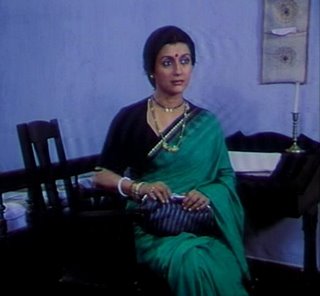 Aparna sen
Aparna senCast and Credits:
Shabana Azmi .... Neeta
Shreeram Lagoo .... Professor (Neeta's father)
Aparna Sen .... Professor's student
Uttara Baokar .... Neeta's mother
Roopali Ganguly .... Seema (Neeta's sister)
Arjun Chakraborty .... Neeta's brother
Manohar Singh .... Neeta's uncle
Anjan Dutt .... Neeta's boyfriend (as Anjan Dutta)
Lily Chakravarty .... Neighbor
Anil Chatterjee .... Arunbabu
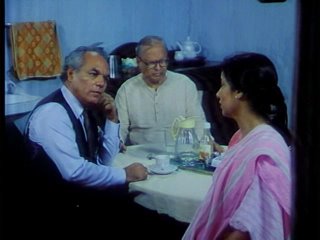 Manohar Singh & Anil Chatterjee
Manohar Singh & Anil Chatterjeemusic by jyotishka das gupta.Music is worth mentioning in this movie.Jyotishka das gupta sustains the tension and mood from the start to finish with some good background score.
 Mrinal Sen
Mrinal SenAwards and Recognition:
Uttara Baokar won the 1998 national award for best supporting actress.
"Ek Din Achanak" got a special mention at the Venice International Film Festival.
Trivia:
The author professor and aparna talk about is Irfan Habib
**********spoiler*********
The movie comes to a beautiful end. One year after the professor disappeared all the family members sit in there house and talk about how wrong they were in perceiving there father. Neeta declares that there father was just an ordinary man and even he realized it.
And the professor's wife says that, till now she didn't say something that their father said. which is
"The most saddest thing is that there is only one life.A man only lives once."

The professor has pressed the Reset button of his life.He is starting over all again.A new life with what ever he had learned so far.
**************************
Wednesday, September 27, 2006
In search of the RoseBud
In India directors don't mind making change with the content, but they are very afraid ,when it comes to form.There are not many movies that have non linear narration styles.Shatranj ki khiladi/suraj ka satvan goda are some movies that are on the top of my mind, when i think about non linear narration.But there are some other movies too.I want to talk about one particular style.The narration style of orsen well's citizen kane.
When i say the Orsen Well's classic narrative technique, i mean the construction of a protagonist through various peoples who were associated with him/her. This style has been adapted by many directors.It has been adapted in a few indian movies too.Iam going to write about 3 good movies that followed that style.
Ek Din Achanak
Kathavaseshan
Sardari Begum
When i say the Orsen Well's classic narrative technique, i mean the construction of a protagonist through various peoples who were associated with him/her. This style has been adapted by many directors.It has been adapted in a few indian movies too.Iam going to write about 3 good movies that followed that style.
Ek Din Achanak
Kathavaseshan
Sardari Begum
Tuesday, September 26, 2006
Nizhalkuthu(shadow Kill) - Malayalam -2002

For all those who have been waiting to see a Adoor movie.Here atlast one of his movie is out on DVD.First run features in alliance with The Global Film Initiative a nonprofit foundation has come out with the Global film initiative. The Initiative is to promote cross-cultural understanding through the medium of cinema. And adoor's last movie Nizhalkuthu has found a place in their collection.
Nizhalkuthu is another good movie from one of india's finest directors, Adoor Gopalakrishnan.This time he tells the story of a poor old hangman called Kaliappan.Through Kaliappan's story, adoor throws at us various questions regarding, justice and responsibilities. Well, more than the story and the moral question's it is the way that the story is narrated that makes you feel that you have watched a work from a master director.
The story is set in the pre independence time period, in the early 1940's.A time period when india still had is past as kings and queens, present as british and future as freedom fighters. Kaliappan is a hangman for the state of travancore. He lives with his wife, son and daughter .His son is a freedom fighter, who has taken to gandhian ways.The story slowly builds up to a hanging that is about to take place.The night before the hanging, Kaliappan comes to know that, the person that he is going to hang is innocent. what happens to that execution is the story. Well that is the shortest summary of the story.
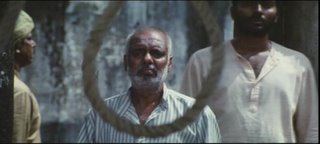
A typical movie executioner is a bulky evil looking person, who comes as a guy who is insensitive towards the accused. But in this movie,adoor shows a different type of an executioner.A meek and guilt driven guy, who is like any of us. He is a god fearing family man, with all the problems that a man of his age faces.And oduvil unnikrishnan has brought that executioner to life with a very good performance.
The story is nothing without the narration style.Adoor proves why he is a master director with his narration style. For a layman it is a simple straight forward narration, you can hardly find anything complex. But this is a complex narration. Details on the Analysis section.
The movie is multi layered and filled with so many interesting scenes. Repeated watching makes the movie more enjoyable and keeps revealing more things than what you saw the first time. There isn't a single scene wasted in the movie. Every scene is important. Especially what the two villagers talk. The villagers are personification of the public. So watch carefully.
 Reeja
ReejaCast and Cedits:
Oduvil Unnikrishnan .... Kaliyappan the executioner
Sukumari .... Marakatam, his wife
Reeja .... Mallika, the younger daughter
Thara Kalyan .... Madhavy, the older daughter
Murali .... Vasu, Madhavy's Husband
Sivakumar .... Mallika's Lover
Sunil .... Muthu, Kaliyappan's son
Nedumudi Venu .... Jailer
Vijayaraghavan .... Jailer
Jagathi Sreekumar .... Maharajah's Officer
Indrans .... Barber
Cinematography by
Sunny Josef
Ravi Varma
Film Editing by
Ajith
 Murali
MuraliGood acting by everyone. Oduvil Unnikrishnan as kaliappan has given credibility to the character.He was great, as an alcoholic or a guy bearing the guilt of killing innocent men. The 2001 best actor national ward winner murali, comes for a few scene and with other like sukumari,vijaya raghavan and nedumudi venu , plays his part to perfection.Reeja and sunil the new faces are also good.
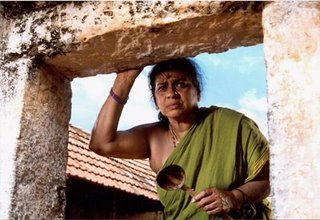 Sukumari
SukumariMusic:
Music is by Maestro illayaraja.I generally like his background scores. But not in this one.He comes up with his usual stand out background scores, which some times makes us feel that it is too much for a slow moving, minimalistic movie like this.
Awards and recognitions:
2002 kerala state awards
Best Actor :Oduvil Unnikrishnan(Nizhalkuthu)
Second Best
Actor :Jagathy Sreekumar(Nizhalkuthu, Meeshamadhavan)
Best Photographer :Mankada Ravivarma, Sunny Joseph (Nizhalkuthu)
Best Editor :B. Ajithkumar (Bhavam, Nizhalkuthu)
Best Art Director :Suresh Kollam (Nammal)
Best Sound Recordist : N. Harikumar (Nizhalkuthu)
Best Costume Designer : S.B.Sathish (Nizhalkuthu)
Links:
Nizhalkkuthu Dvd
Nizhalkuthu reception
Trivia:
* Sunil was actually rajeev menon's assistant. Adoor who came to rajeev menon for some help with selecting camera, came across sunil and he became an actor. He has acted in few films in malayalam.He also did a hero role in tamil movie called Chithiram Pesuthadi under a different name, Narain.
* Oduvil passed away on 27 May 2006.
Title:
If you are still wondering what the title means?. Shadow kill means killing indirectly.It comes from the practice of killing a person by killing a doll or some other objects.This practice is mentioned in mahbharatha. Here is an interesting story from the mahabharatha episode.You can relate the malayan character with that of kaliappan character in the movie, reluctant to do the shadow kill and feeling guilty about it.
Abhicara - Black Magic.
Duryodhana orders Malayan to kill Pandavas by piercing the shadow. Malayan refuses saying that both Pandavas and Kauravas are kings to him. Also Krishna is with the Pandavas,hence he will not be able to do so. Duryodhana threatens to kill him. To avoid the work, Malayan demands things such as lamp of sun, plate of moon, measure of darkness,eggs of elephant, arrows of Rama, twenty one leaves of water etc., which are impossible to get.He also demands that Dussala (Duryodhana's sister) should be sacrificed in the abhicara.
This enrages Duryodhana. He suspects that Malayan is trying to avoid the work by giving excuses. He repeats the threat to kill him if Malayan does not perform the task. Malayan promises to perform the abhicara using available things.While performing the abhicara of shadow piercing, the Malayan looks at the black (Anjanam) stone. He is surprised that the shadows are not visible on the black stone. Realising that if this abhicara is not successful, the king will kill him, he prays to the gods to help him.Then he sees the shadows along with Krishna. He is deeply worried and prays to have mercy on him. Then Krishna's shadow disappears. Malayan realizes that his aim is accomplished. He prays for pardon saying that he was forced to do the task.
After killing the Pandavas by shadow piercing, Malayan is praised by Duryodhana who gives him many gifts. On the way back, Malayan thinks that he has committed a sin and how he can face his wife.Seeing him unhappy, his wife asks the reason.Malayan tells her that on the way he saw a deer with five does and he killed the does by abhicara. The worried wife further questions him. Malayan admits that he was forced by Duryodhana to kill the Pandavas by nizhalkkuttu (piercing the shadow).Hearing this, the wife is devastated and enraged. She tells Malayan that he will also experience Kunti's grief now. She kills her own son and rushes to see Pandavas. Seeing this Malayan falls unconscious.
Kunti finds her sons dead, suddenly. She cries out and prays to Krishna to help her. Krishna appears. Kunti is relieved to see Krishna. Krishna touches the Pandavas and revives them.Then Malayan's wife arrives. Krishna asks her why she has come. She tells Krishna that Malayan was threatened and forced by Duryodhana to kill the Pandavas by nizhalkkuttu (shadow piercing).
Krishna tells her that he knows everything. Killing her own son was an extreme step.Her son will live again. There will not be any hatred towards Malayan.All these were caused by Duryodhana . Yudhishthira and Kunti praise Krishna.Krishna assures Kunti that he will always protect Pandavas.
from
http://www.geocities.com/harindranath_a/maha/variation/nizhal.pdf

Analysis:
**** spoilers a head. I recommend reading this section after watching the movie.****************
The movie is filled with ironies, counterpoints and the cyclic nature of things. For example the Cylclic nature of life and death is shown in the way the rope that is used to hang the prisoner is burt and the ashes are again used to heal sick peoples. And when one rope ends another one becomes available.
Comming back to the narration, Kaliappan at the start, drinks at the arrack shop and says that he hanged an innocent man. Actually that scene is not the start. That is actually the end of the movie.He was actually talking about the guy who he(rather his son) executes later in the movie .The whole story is actually a flash back. But you don’t know when the flash back begins.
 Nedumudi venu & Vijaya Raghavan
Nedumudi venu & Vijaya RaghavanBefore the execution night kaliappan sits with the jailers are drinks. The jailer starts telling a story. Adoor uses an awesome technique here, he makes kaliappan visualize the whole story in terms of his family members. This way he personalizes the story to make the listener feel the pain.
A hangman,or for that matter anyone, won't feel the pain or helplessness of an innocent guy, who is going to be hanged. For them he is a distant person who they don't know, who they cannot sympathize. So when they read a news article or hear a news about an innocent man hanged.They don't feel anything for the denied justice.They dont care whether it is a real kill or a shadow kill.An example is the two villagers at the start of the movie.Talking about the sensational case where the influential real culprit got away from punishment and how a stupid boy got the death sentence. How can you make these people feel for the injustice that has happened?. You can do that only when you make the pain & injustice personal. In order to make the hangman sympathize, Adoor makes him visualize the story of a third person in terms of the characters that he already knows. With those characters everything falls into perspective and he can sympathies for the man to be hanged, Feel the pain of injustice and get angry over the real culprit, not being punished.

Another example of the cyclic nature of the movie is who has to bear the sin. The two villagers who basically represent the public come in 2 scenes and contribute a lot to the movie. In the second scene they talk about who bears the sin of killing an innocent man?. who is accountable to god?. One villager says that it is the king as he is the one who orders the hanging, for that the other says the king escapes that by a practice he follows. The king actually sends a letter to the person to be hanged, revoking the hanging sentence and pardoning him just before the execution. But the message is deliberately made to arrive a few minutes after the hanging. So by sending the pardon letter, the king washes off his sins, he says.
That throws the question, who actually bears the sin?.If the king is gone then it must be the hangman. But Again coming back to the cyclic nature of things in the movie.Kalippan every time prays to goddess kali, especially before execution about how he is just an instrument in the goddess's hands and how everything that he does is her own actions.He uses words like "You are the sin and the sinner". By these prayers kaliappan squarely puts the blame on the goddess herself.
As i said before, the movie is filled with ironies and counterpoints.Here are a few scenes that come to my mind.
**As the day of execution nears, the public starts thinking that the power of kaliappan has increased. The women who bathe at the tank, go to the level of telling that there is a halo around his head. But in reality, Kaliappan becomes more disturbed, more alcoholic, more afraid and weak.
**There is a scene in which the school teacher teaches a poem about the certainity of death in the class, and kaliappan's daughter bleeds and attain's puberty, a sign of birth.
**Adoor cuts the scene of muthu, Kaliappan's gandhian son spining the cotton with that of the prisoners spinning the threads to make the hanging rope.
**Adoor puts muthu as a counterpoint to kaliappan character. Muthu is gandhian who is against drinking, Kaliappan is an alcoholic.Muthu is a vegetarian, he is against killing animals.Kaliappan executes peoples even after knowing that they are innocent.
**Lot of people complained about how the puberty function of mallika is shown for a long time and it is there just to appease the foreign audience. But i think it was shown more to keep in sync with the various other death scenes that are shown in the movie. In the later part of the movie there are long scene of preparation for the hanging, if you consider the puberty function as a counter point to those death scenes in the movie. Then you can understand why that scene was there and why that long.

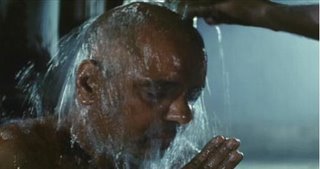
**At the start of the movie the rich guy asks sunil about his father and laughs at him for being a gandhian and asks him."Do you think you and gandhi can bring freedom to us?". You can take this statement in two ways, one even though sunil is a gandhian he is not steadfast on his principles. He compromises for his family. When his mother asks him not to go to the club to give the handspun threads and take care of the household work. He obliges and later in the movie he again compromises for his father.So the unsteadfast sunil is not going to bring freedom for the villagers.
If you take the same dialogue with gandhi bringing freedom to us. It could be a suggestion that he still hasn't got us the real FREEDOM.
Also Adoor hits at few things in the movie.

##The rich villager after talking to sunil, looks at the women who passes by and asks the other guy, who she is. Later they both talk about her and the talks convey that the rich guy might go after her. Is that an indication of some crime to happen later??. Will another woman be violated. Will another rich man escape the law?. will another innocent/poor guy be punished wrongly?.
##At the end of the movie the gandhian son who wears the white cap and kurtha is shown in black dress and black cap.A sign of a dark future for him??. He seemed more caring and fragile person. Will he also be suffering like his dad?.

The jailer when narrating the story to kaliappan starts with describing the beauty of the village and the innocent love story of the village girl.Everything seems to be perfect.Till the evil thoughts of one man comes out.All the peace and beauty in the world or only destroyed by the evil thoughts of human beings.


If you notice there are lots of shots of natural scenery and scenes involving the five elements.Adoor with these scenes and the many counterpoints, cyclic things in the movie, tries to bring a cosmic balance to the story.
******************************